
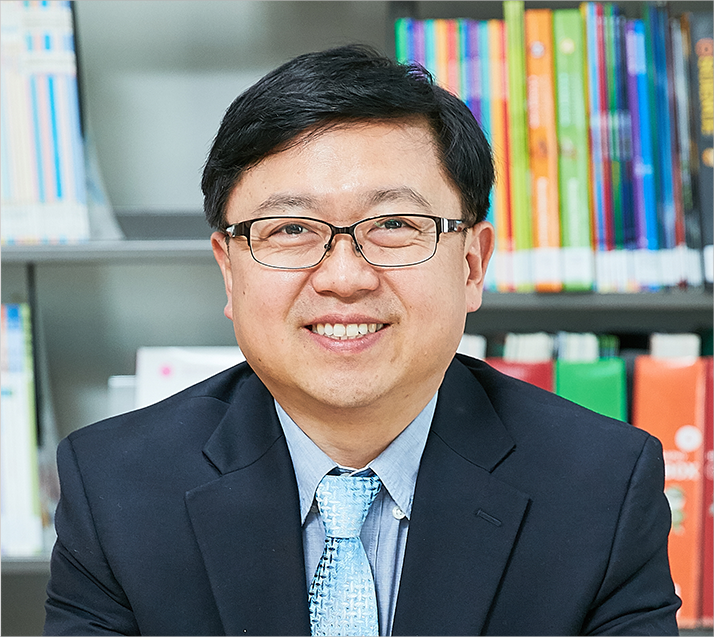
The Future of Korean Language Education
Evolving Through EdTech Innovation
A Conversation with Park Chan,
Adjunct Professor at Seoul National
University and Gyeongin National University
of Education
Technological advancements are expanding the boundaries of education. As new technologies such as AI (Artificial
Intelligence), VR (Virtual Reality), and AR (Augmented Reality) are being integrated into Korean language
education, learners can now enjoy more immersive and personalized learning experiences. We spoke with Professor
Park Chan, an expert in EdTech and the application of generative AI, about the transformations and potential
EdTech brings to Korean language education.
Hello, Professor. Thank you for joining us for this interview. To begin, could you please introduce yourself
to the readers of Monthly Knock Knock and share a bit about your research and teaching fields?
Hello. My name is Park Chan, and I am an elementary school teacher, a writer on future education, and an
instructor at Seoul National University and Gyeongin National University of Education. I originally majored in
mechanical engineering and worked as an engineer at a research lab for an automobile company. However, I found
myself drawn to the field of education and ultimately chose to become a teacher. While working as an elementary
school teacher, I have been researching various teaching methods to provide students with better learning
experiences.
Drawing on my background as an engineer, I have developed a strong interest in science and creativity education,
digital education, software and AI education. I have been exploring instructional methods that go beyond simply
teaching technology to help students develop logical thinking and creative problem-solving skills. Based on this
research, I earned a doctoral degree and currently teach future education-related courses to university students
and in-service teachers at Seoul National University and Gyeongin National University of Education. I have also
authored 16 books on digital education, seeking effective directions for future education based on my
experiences and studies. Moving forward, I aim to continue researching AI-based personalized learning,
integrated STEAM education, and teaching methods for creative problem-solving. I will keep analyzing the impact
of digital technology on education and exploring ways to apply it effectively in actual educational settings.
 Professor Park Chan’s AI-generated avatar
Professor Park Chan’s AI-generated avatar
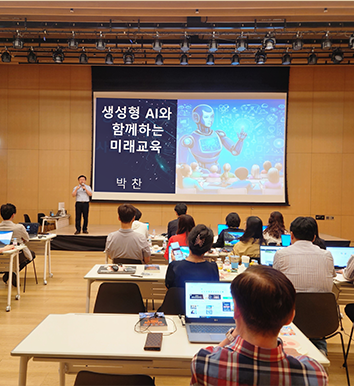 Professor Park Chan delivering a lecture titled “Future Education with Generative AI” to in-service teachers
Professor Park Chan delivering a lecture titled “Future Education with Generative AI” to in-service teachers
Professor, you often give lectures on the use of technologies such as AI (Artificial Intelligence), VR
(Virtual Reality), and AR (Augmented Reality). We’re curious—how do you think these technologies can be
applied specifically in Korean language education?
Advanced technologies such as AI, VR, and AR can play a significant role in enhancing learner engagement and
creating effective Korean language learning environments.
First, AI is particularly useful in supporting personalized learning. AI-based learning systems can analyze a
learner’s level and patterns to provide customized feedback and assist in real-time with pronunciation
correction, grammar adjustments, and sentence generation. In particular, using AI chatbots or speech recognition
technology allows learners to practice real-life conversational scenarios, which can be highly effective.
VR can provide Korean language learners with immersive environments that simulate real-world situations. For
example, virtual settings such as markets, airports, and restaurants can be recreated so that learners can
experience these contexts firsthand and acquire Korean naturally. This goes beyond traditional classroom
instruction to deliver deeply engaging, immersive learning experiences.
AR is used to make learning materials more intuitive and interactive. With AR, textbook content such as words or
sentences can be visually rendered to aid comprehension, and it can also be applied to learning Hangul
characters or exploring Korean culture. Ultimately, these technologies serve as tools that go beyond simple
language acquisition—they enable learners to naturally acquire and apply Korean in real-life contexts.
You also delivered a lecture at the KSIF Online Real-Time Korean Language Education Workshop held on March 14.
Could you tell us what key topics you focused on during your session?
At the Online Real-Time Korean Language Education Workshop, I delivered a lecture on the topic “How to Create
Metaverse-Based Lesson Materials Using EdTech.” The focus of the lecture was to introduce practical methods that
allow teachers to easily create and utilize high-quality content for Korean language instruction within
Metaverse.
Specifically, I covered methods for real-time communication using the sandbox function of Padlet, content
exploration using Perplexity (an AI-powered search tool), visualizing text-based materials with Napkin AI, and
creating educational songs using SUNO AI. By utilizing these tools, teachers can design creative and immersive
Korean language classes. I particularly emphasized how these resources enable natural interaction with learners
in Metaverse environments and how the use of intuitive visual aids and AI technologies can lead to more engaging
learning experiences.
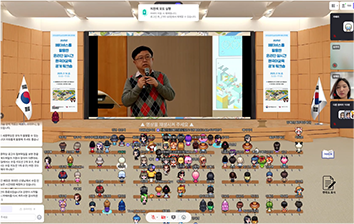
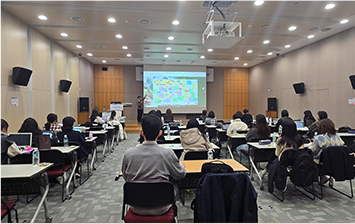
Professor Park Chan delivering a lecture on “How to Create Metaverse-Based Lesson Materials Using EdTech” at the
KSIF Online Real-Time Korean Language Education Workshop, held both online and offline on March 14
Professor, how do you think Korean language education using EdTech tools like Metaverse and AI differs from
traditional online education?
Traditional online education has largely focused on watching video lectures and submitting assignments. In
contrast, Korean language education that incorporates Metaverse and AI technologies provides a more immersive
and interactive learning environment.
In a Metaverse setting, learners are not just passively viewing content on a screen—they can actively perform
roles and practice Korean in a virtual space. For example, learners can visit a virtual restaurant or go
shopping within Metaverse and engage in real-time Korean conversations such as placing orders or asking
questions. These scenarios help build confidence in using the language naturally in real-life contexts.
AI also sets itself apart as a major differentiator from conventional online education. With AI technology,
learners can receive real-time correction of pronunciation and grammar, as well as personalized learning
pathways. Whereas traditional online lectures tend to be one-way transmissions of information, AI-based learning
analyzes a learner’s level and patterns to provide tailored feedback, enabling personalized learning
experiences.
Ultimately, Korean language education utilizing Metaverse and AI offers more immersive, interactive, and
personalized learning compared to traditional online methods. I believe these technologies will continue to
enable learners to acquire Korean in more efficient and enjoyable ways, and I intend to keep exploring various
methods to make that possible.
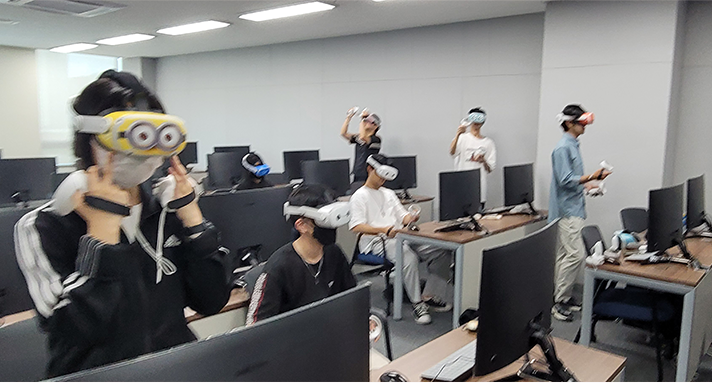 Students immersed in educational content through VR (Virtual Reality)
Students immersed in educational content through VR (Virtual Reality)
In your opinion, what is the most important factor to consider when designing lessons using these emerging
technologies in Korean language education both in Korea and abroad?
When designing Korean language lessons using digital technologies, the most important factor is ensuring that
the use of technology aligns with the learning objectives and produces tangible educational outcomes.
First and foremost, a learner-centered approach is essential. New technologies should not simply serve as tools
for sparking interest—they must be designed to provide real support in the learner’s language acquisition
process. For example, when using VR or Metaverse, it should go beyond a mere virtual experience and create an
environment where learners can actively use Korean and engage in meaningful interaction.
Accessibility and ease of use are also crucial considerations. Since learners come from diverse age groups and
backgrounds, it’s important to offer interfaces that are easy to access and operate, rather than relying on
overly complex technologies. This is especially important for overseas learners, who may face limitations in
internet connectivity or device availability, making it necessary to select technologies that are broadly
accessible and practical.
Lastly, the role of the teacher must also evolve. In tech-enhanced education, teachers are no longer just
conveyors of knowledge—they become facilitators and coordinators of learning experiences. Therefore, teachers
must be provided with sufficient training and support to effectively incorporate new technologies into their
teaching.
Ultimately, what matters is not the technology itself, but how it is used in a pedagogically meaningful way. The
value of these technologies is maximized only when they are used to genuinely support learners in acquiring
Korean and enhancing their real-world communication skills.
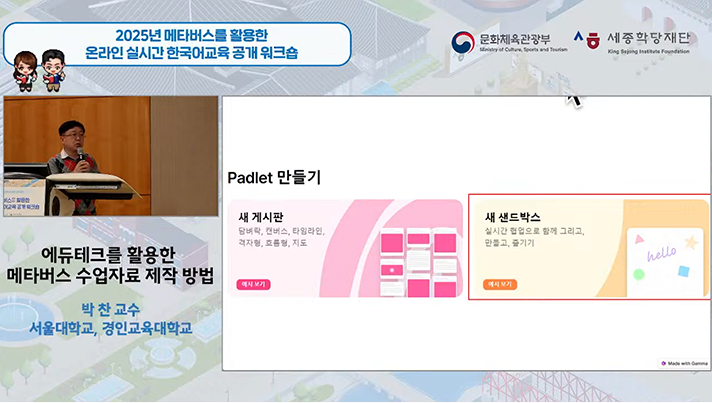 Professor Park Chan explaining the sandbox function of Padlet during his lecture on “How to Create
Metaverse-Based Lesson Materials Using EdTech”
Professor Park Chan explaining the sandbox function of Padlet during his lecture on “How to Create
Metaverse-Based Lesson Materials Using EdTech”
Could you offer some advice on the competencies Korean language teachers should develop to effectively utilize
emerging technologies in the field of EdTech?
To effectively leverage EdTech, Korean language teachers need to possess digital literacy and be able to
appropriately apply various technologies such as AI (Artificial Intelligence), AR (Augmented Reality), VR
(Virtual Reality), and Metaverse in their lessons. Beyond simply being familiar with the technology, it is
essential that teachers are capable of designing learner-centered classes aligned with educational objectives.
In addition, the ability to use AI and data to analyze learners’ weaknesses and provide personalized feedback is
increasingly important. However, even in an era where technology is emphasized, it remains crucial for teachers
to understand the core of education and strike a balance between pedagogy and technology.
Lastly, because EdTech is a rapidly evolving field, teachers must continually learn new technologies and adopt a
flexible mindset to adapt to change. A teacher who effectively uses new technology is not merely a tech expert
but someone who provides learners with optimal educational experiences through technology.
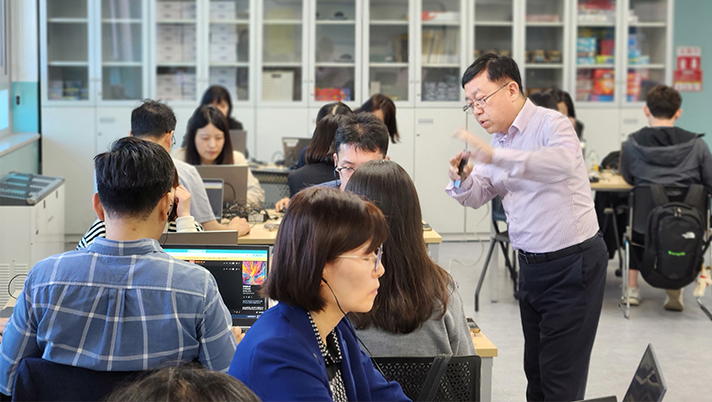 Professor Park Chan leading a teacher training session on the theme “Teaching with Generative AI”
Professor Park Chan leading a teacher training session on the theme “Teaching with Generative AI”
We’d like to hear your thoughts on the changes and future prospects EdTech may bring to Korean language
education. Additionally, could you offer some advice on how KSIF should prepare for these developments?
EdTech is expected to significantly transform the methods and approaches of Korean language education. As
technologies such as AI (Artificial Intelligence), VR (Virtual Reality), AR (Augmented Reality), and Metaverse
continue to evolve, Korean language learners will be able to study in personalized learning environments,
vividly experience the language, and simulate real-life usage scenarios. AI-based learning systems, in
particular, can analyze learners’ levels and learning patterns to provide personalized feedback, while VR and
Metaverse can immerse learners in authentic Korean language settings, helping them build practical language
skills. AR technology also allows for textbooks and learning materials to be transformed into intuitive and
interactive content, enhancing learners' comprehension.
To respond effectively to these changes, KSIF should focus on developing Korean language education content
optimized for digital environments and strengthening teachers’ competencies in using these technologies. This
could include building AI-based personalized learning platforms, developing Korean conversation programs using
VR and Metaverse spaces, and producing smart textbooks that incorporate AR technology. It is also essential to
systematically operate EdTech training programs for teachers and to continue conducting research and fostering
collaboration to respond swiftly to technological changes.
Ultimately, for EdTech to be used effectively, the priority must not be the technology itself, but the learners’
experience and educational impact. I hope that KSIF will take a leading role in this evolving landscape and
continue to provide innovative and effective Korean language education to learners around the world.